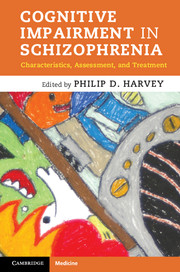Book contents
- Cognitive Impairment in Schizophrenia
- Cognitive Impairment in Schizophrenia
- Copyright page
- Contents
- Contributors
- Preface
- Abbreviations
- Section 1 Characteristics of cognitive impairment in schizophrenia
- Section 2 Functional implications and course
- Chapter 5 Neurocognition and functional outcome in schizophrenia: filling in the gaps
- Chapter 6 Cognition and work functioning in schizophrenia
- Chapter 7 Cognition and functional status in adult and older patients with schizophrenia
- Chapter 8 Social cognition and its relationship to neurocognition
- Chapter 9 Cognitive functioning and awareness of illness in schizophrenia: a review and meta-analysis
- Section 3 Genetic and biological contributions to cognitive impairment
- Section 4 Assessment and treatment of cognitive impairment and related features
- Index
Chapter 7 - Cognition and functional status in adult and older patients with schizophrenia
from Section 2 - Functional implications and course
Published online by Cambridge University Press: 05 February 2013
- Cognitive Impairment in Schizophrenia
- Cognitive Impairment in Schizophrenia
- Copyright page
- Contents
- Contributors
- Preface
- Abbreviations
- Section 1 Characteristics of cognitive impairment in schizophrenia
- Section 2 Functional implications and course
- Chapter 5 Neurocognition and functional outcome in schizophrenia: filling in the gaps
- Chapter 6 Cognition and work functioning in schizophrenia
- Chapter 7 Cognition and functional status in adult and older patients with schizophrenia
- Chapter 8 Social cognition and its relationship to neurocognition
- Chapter 9 Cognitive functioning and awareness of illness in schizophrenia: a review and meta-analysis
- Section 3 Genetic and biological contributions to cognitive impairment
- Section 4 Assessment and treatment of cognitive impairment and related features
- Index
Summary
- Type
- Chapter
- Information
- Cognitive Impairment in SchizophreniaCharacteristics, Assessment and Treatment, pp. 110 - 125Publisher: Cambridge University PressPrint publication year: 2013
- 1
- Cited by



